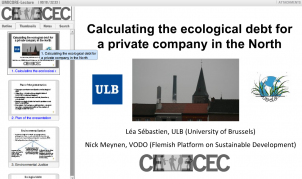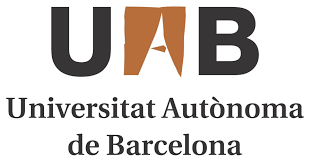
EJOLT, in collaboration with Fundación Neotrópica, a Costa Rican NGO, and UCI (Universidad para la Cooperación Internacional) is running an online course “Ecological Economics and Environmental Justice”, taught through civil society organisation (CSO) case studies. It will run from April 4, 2014.
What past students have said:
“Brilliant course for people working in NGOs wishing to understand the basic concepts of ecological economics. The methods and tool introduced through case studies, accompanied by interactive discussions and lectures, illustrated the possible dimensions of their use well. ”
“I am currently doing a master’s degree in environmental sciences, and I felt the need to complete the curricula with ecological economics topics. This course provided a great opportunity to better understand participatory processes like multi-criteria assessment, and concepts of environmental justice, which I feel are key to finding better solutions to the crises we are facing today. “
“With its interactive approach, this course has helped me to understand better ecological economics methods and the concept of sustainable development. I would recommend this course to all those who are working in NGOs or simply interested in enriching their knowledge of issues related to sustainable environmental management.”
“This course is useful for CSOs/EJOs looking for new approaches and arguments in environmental campaigns, especially ones based on social science and valuation in money terms. Also, the course was a good source of examples and ideas for innovative (and traditional) social arrangements and institutions.”
“My work focuses on participatory development for poverty alleviation through local economic development. The concepts of sustainability from the perspectives of ecological economics are vital to achieving increased quality of life and prosperity for rural communities.”
The course flyer in pdf format is here
This in an interactive course taught in English over sixteen weeks. It features lectures based on CSO and EJO case studies across a broad range of topics, taught by well known ecological economists / political ecologists including Joan Martinez Alier, Bernardo Aguilar, Beatriz Rodriguez-Labajos and Hali Healy. It has been designed for activists interested in understanding and applying the tools of ecological economics to their work, and for researchers of the sustainability sciences interested in the real world application of the concepts and methods of ecological economics and political ecology.
Structure:
Each module is tutored by a leading researcher or practitioner of ecological economics. It consists of a recorded lecture, an assigned case study reading from the core text, and further optional readings. A key feature is the online discussion forum – a virtual classroom where trainees interact with each other and with tutors. Each module ends with the submission of a short assignment that is assessed by the module tutor. The time needed to complete a module depends on depth that students choose to go into with the materials, however a rough estimate is 10-20 hours per module.
The course requires trainees to submit an additional final assignment in the form of a contribution to an interactive map of environmental (in)justices, along with a corresponding “factsheet”, on a particular issue they are familiar with or interested in.
All course elements can be accessed whenever it is convenient for trainees – within the time period (one week) dedicated to each specific module. However, as the lectures cannot be downloaded and have to be watched online, a strong, reliable internet connection is a must.
Course Certificate (non-accredited):
Along with the final assignment, trainees must fill in a course evaluation form before receiving an electronic course certificate. The certificate is a PDF document issued jointly on behalf of EJOLT and Fundación Neotrópica, and their affiliated institutions.
Module Topics for 2014
All trainees take part in the introduction module (1) and select 9 other modules from Modules 2-16 described below: (for more information on some of the modules, you can read some of the case studies here: http://www.ceecec.net/casestudies/).
1. Introduction (compulsory): Ecological Economics, Political Ecology and Environmental Justice Organisations
Social Metabolism (choose any 8 from Modules 2-16)
2) Aid, Social Metabolism and Social Conflict in the Nicobar Islands
3) Distributive Conflicts on Commodity Frontiers – Manta-Manaos and Cordillera del Condor
4) The TAV (High Speed Train) in Italy
5) Let Them Eat Sugar: Life and Livelihood in Tana Delta
Participation and institutions
6) Governance and Environment Investments in Hiware Bazar, India
7) Forestry and Communities in Cameroon
8) The Waste Crisis in Campania
9) EJOs and Legal Avenues for Claiming Environmental Liability
Valuation and other policy tools
10) Local communities and management of protected areas in Serbia
11) Payments for ecosystem services and REDD
12) Environmental justice and ecological debt in Belgium: the UMICORE case
13) “Rip-off(sets): The false solutions of green capitalism” – a critique of climate change adaptation/mitigation measures
14) The Economics of Ecosystems and Biodiversity – recent debates
15) ECOTICOS: multi-dimensional valuation for environmental conflict analysis in Costa Rica
16) Grassroots concepts for sustainability coined by Environmental Justice Organisations
On acceptance to the course students will be asked to list their preferred modules, with one or two alternate choices in the case that some modules are oversubscribed.
Requirements:
-
Regular access to a reliable high speed internet connection,
-
Payment of course fee of USD $275, plus,
-
Purchase of the core text (a special rate), Ecological Economics from the Ground Up (Routledge UK)
Deadline for application: April 4th, 2014
How to Apply: Send a one-page letter of intent, outlining your relevant experience and interests, and why you wish to take the course, and email it to hhealyatceecec(at)gmail.com





I am Ram Charitra Sah with B.Sc., B.Sc. Forestry and M.Sc. Environment Science academic background with distinction division and 14 plus years of working experiences want to join this online course of Ecological Economics as it is very important in our regular work of ensuring environmental justice, climate justice as well as chemical safety related work. As I am working with a NGO called Center for Public Health and Environmental Development (CEPHED), Nepal we do not have fund to pay for this important course and hence writing this to explore the possibilities of getting sponsorship for joining this course . Please do let me know at your earliest possible.
With best regard
Ram Charitra Sah
Executive Director
CEPHED
Kathmandu, Nepal
Tel/Fax 00977-1-5201786
Pingback: Online Course Offering: Ecological Economics and Environmental Justice | USSEE
I am a natural resource management student in Berlin. I would be very interested to further expand my knowledge on ecological politics and economics in tropical areas. I have worked in a renewable energy NGO in Cameroon and grew up in Costa Rica. So for me the tropics are a very important target to focus on in order to combat climate injustices. Thank you,
Nicole moeller
I just discovered the existence of this course. I am really interested!
Applications are actually closed or could it still be possible to register?
About the schedule of the course, I’ve read the duration is 16 weeks, but how many hours each week and each lesson will run at a fixed time or it will be available online whenever during each week?
Thank you.
Best regards,
Silvia
Silvia, Nicole and Ram: good news. You can still subscribe – we postponed the deadline to April 4. Sponsorship is not available.